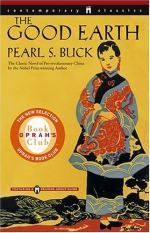|
|
The Good Earth Topic Tracking: Women
Chapter 1
Women 1: The Good Earth gives much insight into the ways in which women were treated in Chinese society around the time in which the story takes place. Footbinding is a practice that is mentioned several times throughout the novel. Small, bound feet are considered beautiful and desirable female characteristics. Thus, when Wang Lung discovers that O-lan's feet are not bound, he is disappointed. O-lan's unbound feet will continue to irritate and repulse Wang Lung.
Chapter 5
Women 2: Female babies are considered worthless and burdensome. In order to ward off evil spirits from their firstborn son, O-lan and Wang Lung pretend that their child is an undesirable female with an incurable disease.
Chapter 7
Women 3: The novel also gives insight into what was considered proper female behavior in Chinese society. Wang Lung is shocked to see his older girl cousin, a daughter of the uncle, talking freely to a village man. A free interaction between a grown man and woman is considered scandalous, inappropriate, and disgraceful.
Women 4: The belief that the birth of a female child in a family is a misfortune reverberates throughout the book. When O-lan has her first daughter, she tells Wang Lung that the child is not worth mentioning. Because it is only a girl, it does not deserve any recognition.
Women 5: When Wang Lung hears that the child is a girl this time, he is extremely distraught and depressed. He even goes as far as to think that an era of bad luck has begun for him because daughters are raised only to be given to other families.
Chapter 9
Women 6: A second girl child is born during the famine. Although it is not explicitly told, it is suggested that O-lan kills it immediately after birth. When Wang Lung examines the body, he sees bruise marks around the dead child's neck. Putting the body of his dead daughter on the ground some distance away from his home, Wang Lung must turn his back on the child's body, knowing that the stray, hungry dog loitering around will eat it.
Chapter 13
Women 7: Girls are like commodity or stock in trade. During a year of famine, families sell their daughters in exchange for money. O-lan tells Wang Lung that she was also sold by her parents to the great house during a difficult time. She is willing to sell their eldest daughter to get Wang Lung back to his land.
Women 8: A man in a nearby hut tells Wang Lung that like many others, he has had to sell his daughters to survive. According to him, others kill their daughters as soon as they are born instead of selling them as slaves.
Chapter 15
Women 9: When Wang Lung returns to the land, he discovers that all of his girl cousins were sold by his uncle during the famine. Even the ugly ones were sold to provide every last bit of money.
Chapter 18
Women 10: As Wang Lung becomes wealthier and more idle, he begins to carefully examine O-lan. Realizing that she is ugly, Wang Lung is repulsed by her appearance. In a rush of anger, he mentions her unbound feet, and O-lan is immediately ashamed and apologetic. She promises to bind the feet of her daughter.
Chapter 25
Women 11: It seems as though a woman who wishes to be loved by her husband needs to have small, bound feet. This is what O-lan seems to have instilled in the second daughter. She tells Wang Lung that she has been ordered by O-lan to not say anything about her footbinding because without bound feet, she will not be loved by her husband.
Chapter 28
Women 12: The sense that female children are commodities to be constantly bought and sold persists throughout the book. During the famine, men sell their daughters in exchange for money or farming tools with which they will rebuild their lives.
Chapter 29
Women 13: When the time comes for his eldest daughter-in-law to give birth, Wang Lung desperately wishes for a grandson. He bribes the goddess of mercy with a new robe and even threatens the Earth God to give him a male grandchild. The birth of a male child in a family is an occasion to be celebrated and appreciated. The birth of a girl, on the other hand, is a shameful and bitter affair.
Chapter 31
Women 14: The wife of the eldest son is a prim and proper town maid. In contrast, the wife of the second son is a village maid who is more open and whose behavior is condemned by the eldest son. The accepted mode of behavior for women in society is one guided by timidity and reservation. When the son of Wang Lung's uncle accosts the two daughter-in-laws, the town maid is properly shy, but the village maid is not. The eldest son disapproves of the second daughter-in-law's behavior.
Chapter 32
Women 15: Once born, girls have no place to claim in the family. When the slave who conceives by the uncle's son gives birth to a baby girl, Wang Lung is relieved because if she had given birth to a son, the baby would have had to be acknowledged. Because it is only a girl, the newborn child is not important.




